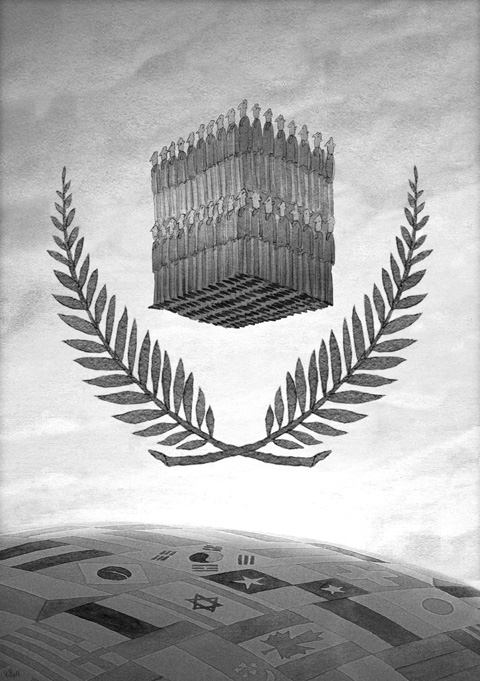Rice brings
human rights to the table with Chinese leaders
AFP, BEIJING
Tuesday, Jul 01, 2008, Page 1
US Secretary of State Condoleezza Rice pressed China¡¦s leaders yesterday on
sensitive human rights issues, but said she was encouraged by their decision to
hold talks with the Dalai Lama¡¦s envoys.
In meetings with Chinese President Hu Jintao (JÀAÀÜ)and Premier Wen Jiabao (·Å®aÄ_)
in Beijing, Rice said she raised the cases of several dissidents detained by
China as well as the ruling Communist Party¡¦s controls on the Internet.
¡§I think that is one of the brewing issues,¡¨ Rice said as she summarized their
discussions on Internet freedoms.
¡§The Internet is becoming so ubiquitous. It shouldn¡¦t be something used to
constrain and limit political speech,¡¨ she said.
Differences over the international response to the political crisis in Zimbabwe
were also discussed, with Rice insisting the UN Security Council had a key role
to play despite China¡¦s preference for a mainly African solution.
Rice said the talks also covered the recent progress in the long-running
campaign to end North Korea¡¦s nuclear weapons programs, problems in the
international economy and climate change.
In brief comments at the start of their meeting, Hu thanked Rice for visiting
China¡¦s earthquake-hit Sichuan Province on Sunday as well as US assistance
following the disaster in May that left nearly 90,000 people dead.
Rice told reporters the recent unrest in Tibet was also discussed, with the top
US diplomat expressing cautious optimism over Beijing¡¦s decision to hold further
talks with envoys of the region¡¦s spiritual leader, the Dalai Lama.
¡§I am encouraged that there at least will be a second round of talks,¡¨ she said.
However she repeated that the US did not accept China¡¦s accusations that the
Dalai Lama was bent on achieving independence for his Himalayan homeland, which
has been ruled by China for nearly 60 years.
¡§The Dalai Lama is a figure of considerable moral authority. He is a figure who
has rejected violence. He is a figure who talks about cultural and religious
historical autonomy,¡¨ she said. ¡§He doesn¡¦t push for political independence.¡¨
Her comments came as the Tibetan government-in-exile said envoys of the Dalai
Lama were expected to arrive in Beijing later yesterday for two days of talks
with Chinese officials.
¡@
¡@
|
|
| ANTISOCIAL
ANT LOVER A local resident holds a pangolin in Taitung County yesterday after catching it near his home.
|
¡@
¡@

¡@
Human
rights require freedom from need
¡@
People must be given all the
basic necessities of life in order to be able to live free from fear and want
¡@
By Louise Arbour
Tuesday, Jul 01, 2008, Page 9

¡@
On June 18, the UN¡¦s intergovernmental Human Rights Council
took an important step toward eliminating the artificial divide between freedom
from fear and freedom from want that has characterized the human rights system
since its inception.
By giving the green light to the Optional Protocol to the 1966 International
Covenant on Economic, Social and Cultural Rights, the Council has established an
important mechanism to expose abuses that are typically linked to poverty,
discrimination and neglect.
It will now be up to the UN General Assembly to provide final approval of the
protocol. If adopted, this instrument can make a real difference in the lives of
those who are often left to languish at the margins of society, and who are
denied economic, social and cultural rights, such as access to adequate
nutrition, health services, housing and education.
Sixty years ago, the Universal Declaration of Human Rights recognized that
freedom from want and freedom from fear are indispensable preconditions for a
dignified life. The declaration unequivocally linked destitution and exclusion
with discrimination and unequal access to resources and opportunities. Its
framers understood that social and cultural stigmatization precludes full
participation in public life and the ability to influence policies and obtain
justice.
Yet this unified approach was undermined by the post-World War II logic of
geopolitical blocs competing over ideas, power and influence. Human rights were
also affected by such Cold War bipolarity. Countries with planned economies
argued that the need for survival superseded the aspiration to freedom, so that
access to basic necessities included in the basket of economic, social and
cultural rights should take priority in policy and practice.
By contrast, Western governments were wary of this perspective, which they
feared would hamper free-market practices, impose overly cumbersome financial
obligations or both. Thus, they chose to prioritize those civil and political
rights that they viewed as the hallmarks of democracy.
Against this background, it was impossible to agree on a single, comprehensive
human rights instrument giving holistic effect to the declaration¡¦s principles.
And unsurprisingly, it took almost two decades before UN member states
simultaneously adopted two separate treaties ¡X the International Covenant on
Civil and Political Rights and the International Covenant on Economic, Social
and Cultural Rights ¡X encompassing the two distinct baskets of rights. However,
only the former treaty was endowed with a follow-up mechanism to monitor its
implementation.
In practice, this discrepancy created a category of ¡§alpha¡¨ rights ¡X civil and
political ¡X that took priority in influential and wealthy countries¡¦ domestic
and foreign policy agendas. By contrast, economic, social and cultural rights
were often left to linger at the bottom of the national and international ¡§to
do¡¨ lists.
Addressing this imbalance between the two baskets of rights, the new protocol
establishes for the Covenant on Economic, Social and Cultural Rights a vehicle
to expose abuse, known as a ¡§complaint mechanism,¡¨ similar to those created for
other core human rights treaties. This procedure may seem opaque, but by lodging
a complaint under the protocol¡¦s provisions, victims will now be able to bring
to the surface abuses that their governments inflict, fail to stop, ignore or do
not redress. In sum the protocol provides a way for individuals, who may
otherwise be isolated and powerless, to make the international community aware
of their plight.
After its adoption by the General Assembly, the protocol will enter into force
when a critical mass of UN member states has ratified it. This should contribute
to the development of appropriate human rights-based programs and policies
enhancing freedoms and welfare for individuals and their communities.
Not all countries will embrace the protocol. Some will prefer to avoid any
strengthening of economic, social and cultural rights and will seek to maintain
the status quo. The better and fairer position, however, is to embrace the
vision of the Universal Declaration of Human Rights and promote unambiguously
the idea that human dignity requires respect for the equally vital and mutually
dependent freedoms from fear and want.
Louise Arbour is UN high commissioner for human rights.
COPYRIGHT: PROJECT SYNDICATE
¡@